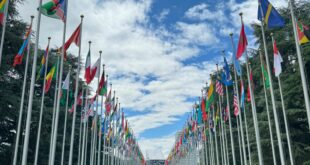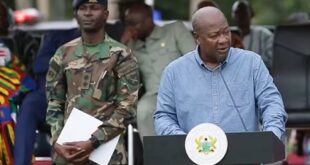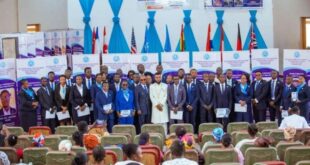It’s no doubt he was one of the greatest journalists Africa had produced and his impact has travelled worlds even after his demise, but it was no mean war, even from his childhood; the battle for greatness.
Racism was the biggest of his challenges and at a very young age. Komla Dumor, in grade 5 in Elementary School; Daffodil Valley, he had his first-ever test which he fought, with the support of his family and even then, proved the world that he had something special.
Little Komla, offered to participate in the inter-schools district Spelling Bee competition, having developed the art of reading from home.
His class teacher at the time who stereotypically thought Komla was only good for sports dismissed the very idea from the start.
But with support from his parents who protested, he earned a spot in the competition and with hard work and determination, blew the minds of all his colleagues, even his teacher to become the first runner-up in the competition.
Komladumorfoundation.org indicates that he, through this, had set the stage for himself and his family in the Sumner Community.
Komla became the star footballer on the only football team – The Kicks in this community with a lot of trophies awarded to him.
He was equally the star athlete. With the help of his mother, Komla learnt to play the piano and soon became a star performer in his school of western classical music.
His subsequent education and life.
In 1983 Komla’s parents left the United States of America for Kano State Nigeria. Much to the anguish of himself and his siblings, Komla had no choice but to relocate too. On arrival, Komla’s parents realized that his intellectual growth needed to be nurtured differently rather than placing him immediately in the Kano State School System. He and his brother were, therefore, put into a personalized program run by a lady from India called Mrs Satur.
It was a driven program meant to draw out of the children, as much of their academic potential as was possible, and set them on a course for excellence. In this period, their parents took a decision not to have television at home, a sore point initially for the children, but later in life, a decision that they would always concede was the best thing for them at that stage of their lives. In 1984, Komla was admitted into St Thomas Secondary School in Kano and was placed in Form Two. He went through the prescribed academic program successfully graduating at the top of his class.
He took the Nigerian Joint Admission and Matriculation Examination for admission to any of the Nigerian Universities at the time. The results of the examination placed Komla in the band of students who could be admitted to start a pre-medical program. He was only 16 years old. It was an extremely hard decision for Komla’s parents to see him leave home so young and at such an impressionable age.
It was hard for Komla himself, but with his sister in the same institution, he launched into his tertiary educational journey. So it was, Komla entered the University of Jos in Plateau State Nigeria. After four years of the pre-clinical studies, Komla abandoned the program and returned to Ghana. On his return home Komla indicated to his parents that he wanted to pursue a law degree and then specialize in forensic science.
His parents thought the idea was great but switching from a science-based program to an Arts program was going to be fraught with dangers. The university authorities recommended that Komla would be on solid grounds if he would take a degree in the Arts or the Social Sciences. Without hesitation he agreed and entered a program in Sociology/Psychology at University of Ghana for a Bachelor’s degree.
Career in broadcasting
In his first year in the University of Ghana, his sister drew his attention to an advert in the newspapers requesting applicants for a position on air as a traffic reporter for the fledgling station, Joy FM. The show and the interview were held at the office of the program sponsor, Mobitel, a telecom provider. Komla showed up at the interview to find hundreds of people waiting for the same position he had come to interview for.
A friend took him to the interview room where Komla told them to stop the interview and send everyone else home. He was the man they wanted. They liked his smile and his confidence. He got the job. Little did they know that for National Service he had worked on Radio at the Ghana Broadcasting Corporation a year earlier doing an early morning program called “Every Day English.”
His new broadcast career thus took off on the back of a motor scooter riding around Accra at 4 am every morning giving reports on traffic in the capital. Soon thereafter, Komla was noticed by the management as an individual not only with a voice for radio, but someone very much in control of the English Language, and very well informed on issues of public policy. This was essentially the bridge on which Komla walked into the position of Presenter of the Joy FM Super Morning Show.
Komla found the Super Morning Show as the biggest and best platform to fight the cause of the ordinary people of the country whose poverty touched him deeply. Komla’s investigative skills led to the exposure of corruption which he regarded as wholly unacceptable. He was prepared to pay the price and his appearance at the Commission of Human Rights and Administrative Justice will remain a point of reference in investigative journalism.
For the many things he had done, the Ghana Journalists Association nominated him as the Journalist of the year 2003. This award was the occasion for some to declare resolutely that he was not a journalist. As Komla himself, in an assessment of this period in his career, would tell his parents “Ignorance is blissful but, painfully, many people suffer as a result of it.”
Komla was always hungry for knowledge. Therefore he took the opportunity to enter the prestigious Kennedy School at Harvard University to study for a Master’s Degree in Public Policy. In a letter Komla wrote to his parents, he stated the following: ‘The academic program has been rigorous and intense. But I have coped very well. I have generally topped my class in most cases and developed some really good relationships with some Professors. Last week alone I got back four (4) papers and the worst grade was A- which is quite remarkable considering the fact that Harvard uses the forced grading curve system.’
Komla graduated at the top of his graduating class and eloquently delivered the Valedictorian address for the class. Soon after his graduation he was offered a position at Brown University in the Africa Leadership Program. This was a program established by the University to allow former Heads of State in Africa to spend a year reflecting and writing their memoirs. Before he could accept the offer, Kwasi Twum, the CEO of Joy FM, arrived in Boston to plead with Komla to return home to take back the Super Morning Show. Komla returned and rebuilt the morning program and raised the bar even further.
The work of Komla attracted the attention of the management of BBC, particularly its African Service, whilst he was still working at Joy FM. At the Initial stages, the BBC sent him to Uganda to develop and present some burning issues in Uganda’s development. Thereafter, he was involved in presenting a special programme covering the migration of young African males through the Sahara into Spain. This programme was very well received.
In 2006 Komla was officially invited to join the BBC African Service in London as host of the radio programme, Network Africa. From 2008 to 2012 he was one of the presenters for the BBC flagship programme, “The World Today.” Because of Komla’s special interest in the experiences of Africans in the Diaspora, he was at home when he presented a special programme on slavery and its abolition in the UK. Through dint of hard work, Komla began an ascent into the elite class of radio and television presenters, not only at BBC, but worldwide.
With this opportunity, Komla saw an avenue to help bring Africa into the mainstream of the global news system. He felt, like many Africans, that the continent had been written out of history and therefore it was necessary to use that platform to create a more accurate picture of the huge potential of Africa. As destiny would have it, in 2011, Komla began his new role on BBC Television and soon became an instant celebrity newscaster.
It did not take very long for the BBC to realise his passion for the transformation of Africa. Consequently, the management of BBC Television decided to develop a programme that focused on Business, Trade and Development in Africa. He became the main anchor for the internationally acclaimed programme ‘Africa Business Report’ on BBC World Television. In pioneering the launch of Africa Business Report, he set out to challenge the stereotypic view of Africa.
He was very passionate about telling the story of a continent that was rapidly changing and taking its rightful place in the world. Komla endeared himself to his audiences because of his own unique style of presentation. Indeed, he raised the bar of broadcast journalism, particularly in his presentation of the new programme, ‘Focus on Africa.’ Komla soon became the face and the voice of Africa Rising. He had become the international Ambassador of the continent. He did not seek to glorify Africa in his Africa Business Report and Focus on Africa. He maintained a balance in his presentation. He was always prepared to dig deeper, only seeking the truth.
He presented, when the opportunity came, the uneven and unequal distribution of resources within those countries. As he would say, “there must be balance” or “please, don’t patronise me.” He was not simply just a ‘broadcast journalist,’ but an intellectual with great analytical skills. BBC Television offered Komla a platform to showcase his varied skills. He was amongst a selected few who constituted the core team that covered the wedding of the Duke and Duchess of Canterbury 2011, the Olympic Games held in London 2012, and the World Cup in South Africa 2010, to name a few.
Komla’s work at BBC Television was not limited to news presentation – he had the opportunity to interview some of the world’s richest and most influential people: Bill Gates, Richard Branson, Alhaji Aliko Dangote and Dr. Mo Ibrahim. In addition, he interviewed very highly placed world leaders; these include Bill Clinton, President Kagame, President John Dramani Mahama and Kofi Annan, former UN Secretary General. The famed Nigerian author, Chimamanda Ngozi Adichie, was also among people Komla interviewed.
He also covered President Barrack Obama’s recent trip to Africa, and the high point in all this was his towering presence in South Africa during the funeral of Nelson Mandela, former President of South Africa. He brought home to Africans and the world at large, the place of Nelson Mandela in World History, and was able to draw out Nelson Mandela’s family to share their moments of life with the African Icon, and their own passion for a new hope for Africa.
These interviews with the Mandela family will remain a special tribute to Komla himself. In his short life, he also became the icon who took history in his hands and strove for his country and continent so that the world might see what is good. In a list published in New African magazine (December 2013), he was named as one of the 100 most influential Africans of the year 2013, with the citation: “It has been a coming of age for Komla Dumor this year. The presenter of Focus on Africa, the BBC’s flagship and first-ever dedicated daily TV news programme in English for African audiences, broadcast on BBC World News, has established himself as one of the emerging African faces of global broadcasting. As a lead presenter for BBC World, Komla has considerable influence on how the continent is covered.”
Personal life
In 2001 Komla married Kwansema Quansah with whom he had three children: Elinam Makafui (God has always been there for me, Praise him) 11years old, Elorm Efadzinam (God loves me, he comforts my heart) 9 years old, and Emefa Araba (I am at peace) 3 years old. His love and devotion to his three children was his greatest mission and he often said that of all the professional and personal nicknames he had, the name he most loved to be referred to was “Daddy” by his three kids. He loved good clothes and good food, loved to laugh and loved to tease. But beyond all the glitter, he was just an ordinary, simple, and caring person.
Death
Komla Dumor died on 18th January, 2014, in his London home, having been on air the day before. How sad that a leading light of African journalism, determined to tell the true story of Africa, has left us so suddenly? But we are consoled that his legacy will remain. We are grateful to all those who are here today to pay their last respect to this young and outstanding human being. May his soul rest in perfect peace.
Additional Information from komladumorfoundation.org
Source: www.ghanaweb.com
 Home Of Ghana News Ghana News, Entertainment And More
Home Of Ghana News Ghana News, Entertainment And More





